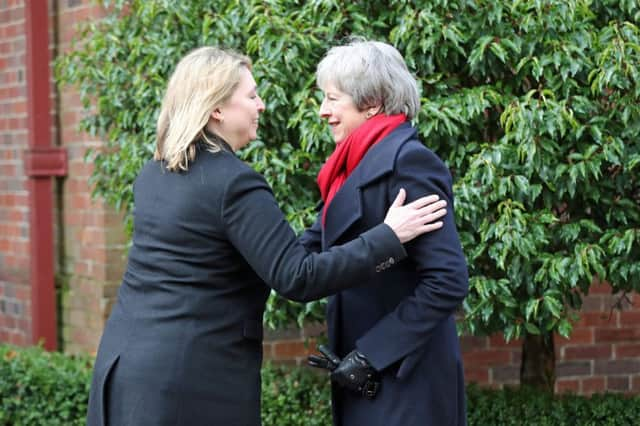Northern Ireland power-sharing deal could be confirmed this week


The Prime Minister met Leo Varadkar and party leaders from across the political spectrum in Northern Ireland in Belfast, with the Taoiseach saying he was “very hopeful” of an agreement “this week”.
The Prime Minister said that “while differences remain, I think there is the basis of an agreement here” and hoped that an executive could be “up and running very soon”.
Advertisement
Hide AdAdvertisement
Hide AdNorthern Ireland has been without a functioning government since January 2017, with two elections and several rounds of talks failing to resolve the crisis.
The DUP/Sinn Fein-led coalition imploded last January amid a row over a botched green energy scheme.
That rift subsequently widened to take in long-running disputes over culture, social issues and legacy.
Sinn Fein and the DUP did not hold direct talks on Monday, but both parties suggested a deal to form a power-sharing government and reconvene the Stormont assembly could be reached.
Democratic Unionist leader Arlene Foster said earlier the tone of the talks had been “very good” and Sinn Fein president Mary Lou McDonald said the two parties were “close to an agreement”.
The main sticking point preventing the restoration of an executive is the Irish language.
Sinn Fein wants a standalone piece of legislation to protect speakers - an Irish Language Act - but the DUP has long insisted it would only consider new laws if they also incorporate other cultures, such as Ulster Scots.
There was speculation over the weekend that three pieces of legislation - an Irish Language Act, an Ulster Scots Act and a broader Culture Act - could be a means to satisfy both sides.
Advertisement
Hide AdAdvertisement
Hide AdIn a sign of the growing momentum towards a deal, the Taoiseach cancelled a scheduled meeting with Welsh First Minister Carwyn Jones in Dublin to travel to Belfast. Mr Varadkar said there was a “lot of work to do” but progress was going in the “right direction”.
On the issue of Brexit and the Irish border, the premier said he sought and received assurances from Mrs May that the first stage agreement reached between the two governments in December would be put into law.
Mr Varadkar said a comprehensive Brexit free trade deal is the best way to avoid a hard border with Northern Ireland, rather than relying on a UK commitment to ‘regulator alignment’ with the EU.
“We both prefer option A as the best option by which we can avoid a hard border in Ireland and that is through a comprehensive free trade and customs agreement involving Britain and Ireland,” he said.
Mrs May said the two sides “are both committed to no hard border”.